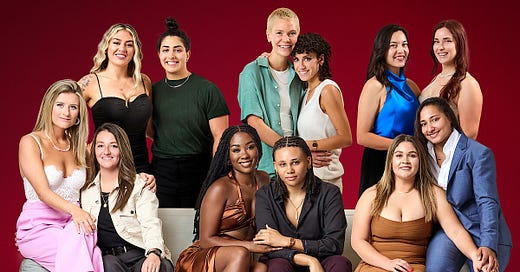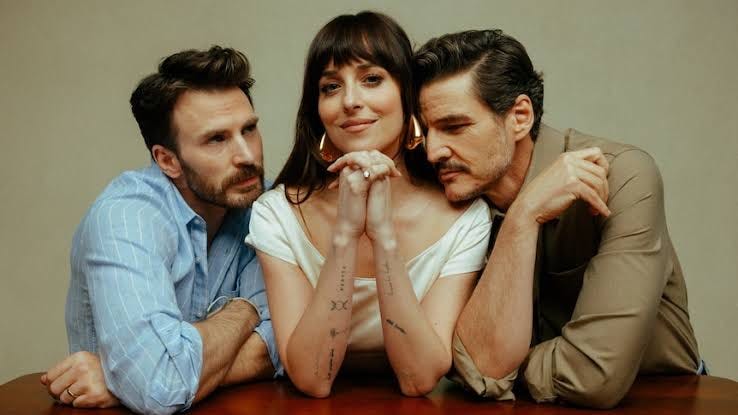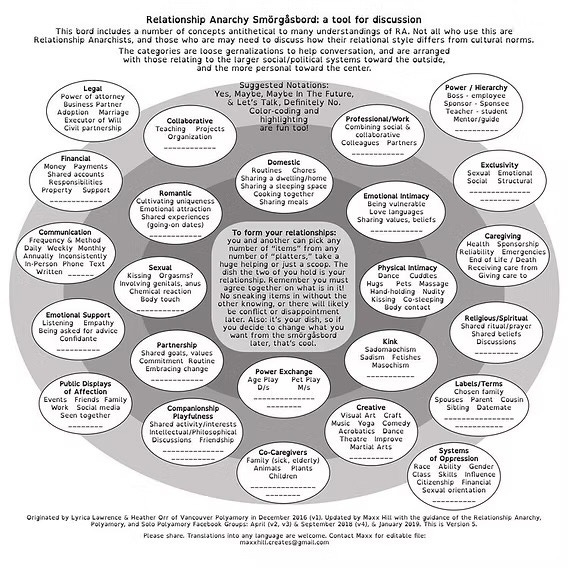Queer Time, Relationship Anarchy, and The Ultimatum: a rigorous analysis
Season two of The Ultimatum: Queer Love has been the topic of conversation in my queer circles since it arrived on Netflix last week. Our favourite endless conversations-about-conversations are back, and the ever-popular reality show promises us a good season this year. I am among the audiences, as is usual with the arrival of a cultural zeitgeist to chat about at the pub, and yet I can’t help but feel a bit excluded from the fun when I doggedly don my critical thinking cap and analyse the show. I’m sorry, I can’t let anything be chill, ever.
The Ultimatum: Queer Love is a spin off of the (less popular, at least from where I’m standing) reality show, The Ultimatum, which follows six couples with the same issue - one of the wants to get married, the other isn’t so sure. With straight contestants, I understand this premise. Although this is slowly changing, heteronormative narratives dictate that marriage must be an ‘end goal’ to a relationship, one of five ‘Objective Life Events’ (OLEs, as set out by Pamela Aronson in her study, The Markers and Meanings of Growing Up: Contemporary Young Women's Transition from Adolescence to Adulthood), that signifies the transition to adulthood. The format makes sense in a reality TV landscape that prioritises the goal of marriage. Shows like Married At First Sight and Farmer Wants A Wife are extremely popular examples of recent formats that focus on matrimony-as-end-goal, and with MAFS Australia claiming a national reach of 2.89M, no wonder Netflix wanted a piece of the pie. However, the question we have to ask ourselves is this: does this concept actually work for queer people?
To do this, we have to venture into some queer theory (don’t worry, I’ll hold your hand). In Jack Halberstam’s ‘Queer Time and Place’, he introduces the concept of ‘Queer Temporalities’ - the idea that the timeline of life for queer people isn’t adjacent to heteronormative milestones. For most queer people, true relationship freedom begins after coming out, a concept that means, according to Kathryn Bond Stockton, that queer children are ‘ghosts’, who ‘grow to the side of cultural ideals’. This means that queer adulthoods are delayed by the coming out process, and we hit ‘milestones’ later than our straight peers, including the five OLEs. I see this directly in my group of friends and wider queer community, which ranges in age from 21-35, although it doesn’t feel this way. 30 year olds in my circles are at similar life stages to me, at 22, and this isn’t odd, especially if they came out in their mid-twenties.
When we apply this to The Ultimatum, there’s a disconnect between the original heterosexual version of the show, and its queer sister show. The women in Queer Love also range in age from 25-30, and yet the entire focus of the concept is on marriage. No one I know is getting married, or worrying about getting married, so right off the bat this strikes an odd chord. There’s also (obviously) a disconnect between the ultimatum givers and receivers, but the reasons for the ultimatums in QL are quite different to the show’s straight counterpart. Take Pilar, a 29 year old contestant on this season who’s been in a relationship with her partner Haley for ten years. Throughout the first few episodes of the show Pilar is continually questioned on her reasoning for not accepting Haley’s proposal, and tells the camera straight - her parents are homophobic, and having her wedding without them would be too painful. My housemate and I bawked at the fact that this story was being equivocated to those of other contestants, such as Bridget, for whom marriage just feels ‘unnecessary’. It’s an entirely different experience, and it feels absurd to compare the two. For some queer people, marriage might mean the end of a relationship with their families forever, making their temporalities take on an entirely different shape to their straight counterparts. Although I haven’t seen the Ulti-straight-um, I can guarantee that no contestant is rejecting their partner’s proposal because of external homophobia from their families.
If I really want to dive into it (and of course, I’m going to), it’s the emphasis on marriage at all that makes the show feel so separate from lived queer experience, as if the producers have just randomly placed a bunch of lesbians into a heteronormative template, without actually checking if it fits. Marriage and family-making has historically been forbidden for queer people, but there’s a revisionist idea that it was always a priority within activist groups. In fact, most queer revolutionaries, particularly lesbians, were against the institution of marriage, seeing it as a way to trap women in domestic possession. It was only after AIDs that marriage began to take on a small priority amongst some activists, which was picked up and utilised by Republicans as a way to argue against ‘The Homosexual Agenda’. It was this backlash from right-wing groups that ended up ultimately furthering the cause, and led to gay marriage becoming legalised in the United States in 2015 (and Australia in 2017!) How easy it is to forget how recently this was! And yet we swing forward ten years to our current day, and suddenly we’re expected to believe that marriage has forever been the dream for the set of queer people who were already twenty when it was legalised. Forcing queer people into straight timelines and temporalities is not a modern concept, but in this scenario we’re meant to pretend that it’s what we want too - the big white wedding (that our homophobic parents won’t attend).
Although I haven’t seen the ‘straight’ Ultimatum, there’s an abundance of heteronormative media I can use as a contrast. Take Celine Song’s 2025 film, Materialists, which I came away from with the taste of disgust and pity frothing in my mouth. The film follows Lucy, a professional matchmaker who’s vowed never to marry someone unless they’re ’revoltingly rich’. This is until she starts dating Pedro Pascal (‘Rich Guy’ - I’m sure he has a name, I just don’t care), and realises, *gasp*, that even though it’s her literal job, there might be more to marriage than a way to make more money! So instead she marries ‘Poor Guy’, Chris Evans, an insufferable broke-actor-type. Not that she seems that happy to be with him either, mind you. Disguised as a rom-com, it has absolutely no laughs (apart from things you’re not supposed to be laughing at, such as the fact that Rich Guy has had a surgery to gain 6 inches in height), and absolutely no romance. Dire stuff. I was astounded to watch a movie so intent on marriage as the ultimate goal, which discusses it constantly as a ‘business investment’. As I watched, I wondered, how would straight people’s (hyperbole, I know all straight people aren’t like this) worlds differ if they discovered you didn’t have to get married? That many people live a perfectly happy life without it?
The irony of watching this film was that moments before it started, over a glass of wine in the lounge, my friend Delphi and I had discussed ‘Relationship Anarchy’, a concept I’ve been obsessing over since I read about it in this Dazed article. Within the first 5 minutes of watching, Delphi leaned over and whispered what I’d been thinking - ‘this film is the furthest thing possible from Relationship Anarchy’. I nodded fervently, and spent the next two hours trying not to cringe. Let me explain. Relationship Anarchy is not a particularly novel concept, it just has a name now - it’s the idea that every relationship one has should be dictated entirely by the terms of the two parties involved. This means no primary partnerships, no prioritising some relationships over others, and total communication on both sides. If you’re dating casually, you’re probably doing it already. For example, if there’s someone you’re in a relationship with where the only facets of that relationship are having sex and going to protests together, then as long as you’re both happy with those terms in this present moment, that’s all your relationship needs to consist of! You don’t need to look at it as a means to gaining a ‘primary partner’, and you can have other relationships that consist of very intense conversations about feelings, if that’s what you want out of that relationship. Perhaps I’m some mad lesbian or something, but I think that sounds a million times better than being in a situationship for six months, worrying if someone might make things ‘official’ without ever communicating what you want. Anyway.
All this to say, I think The Ultimatum: Queer Love is lots of fun, and perhaps I’ve deeped it too hard. These concepts and theorems just happen to be on my mind recently, and I thought I’d try to apply them to some popular media for the lark. Don’t feel too threatened by Relationship Anarchy or Queer Time, especially if you’re straight. If that’s the case, marriage and monogamy has sort of been created for you, and if you want to apply it to your life, that’s your prerogative! This message is more for other queer people who might watch The Ultimatum or Materialists, or Sex and The City or whatever, and think, ‘sorry, but this just doesn’t apply to my actual life?’ To that I say, you’re on the right lines! You don’t need to get married! It’s an outdated patriarchal system that benefits men! Have sex and go to protests with people! (Straight people, you’re also welcome to try this - you might be a lot happier about your relationships xxxx). I hope you’re well.






